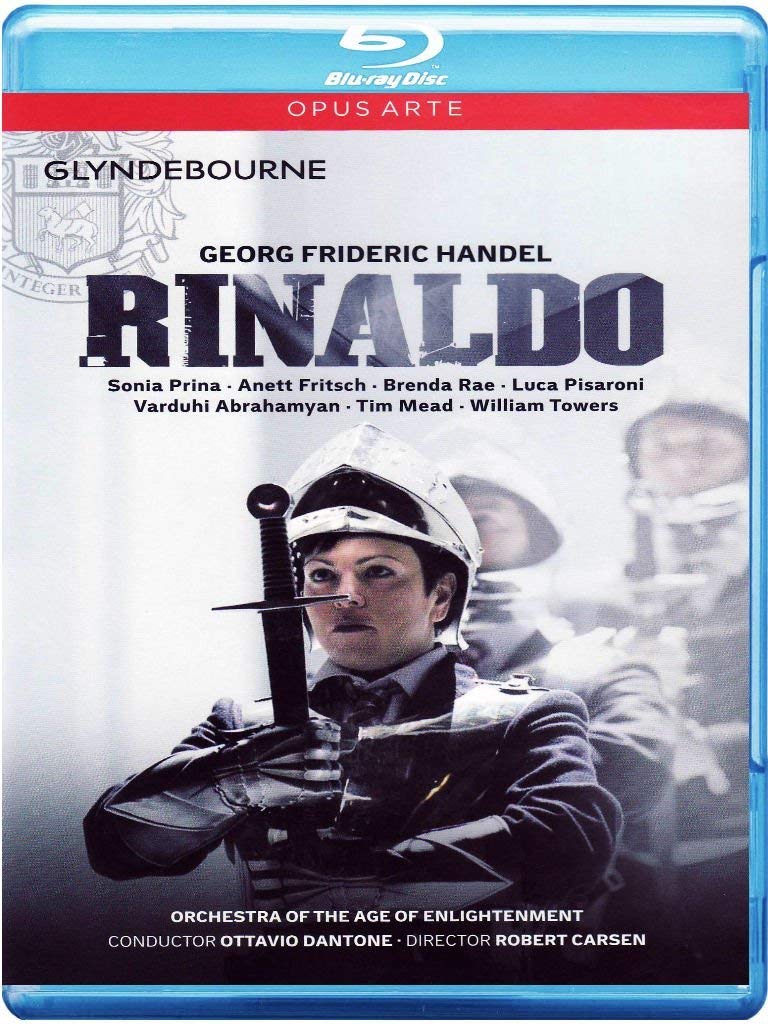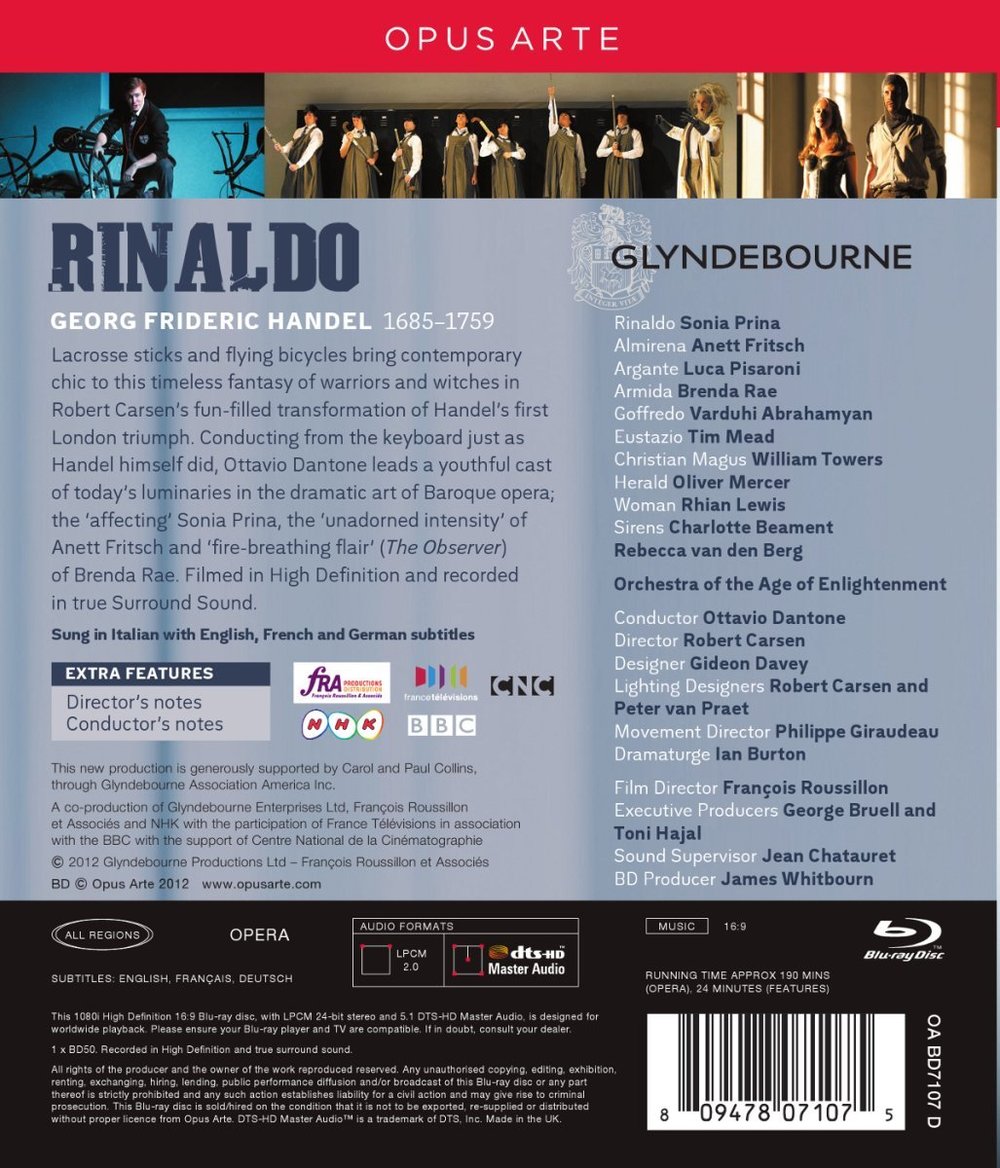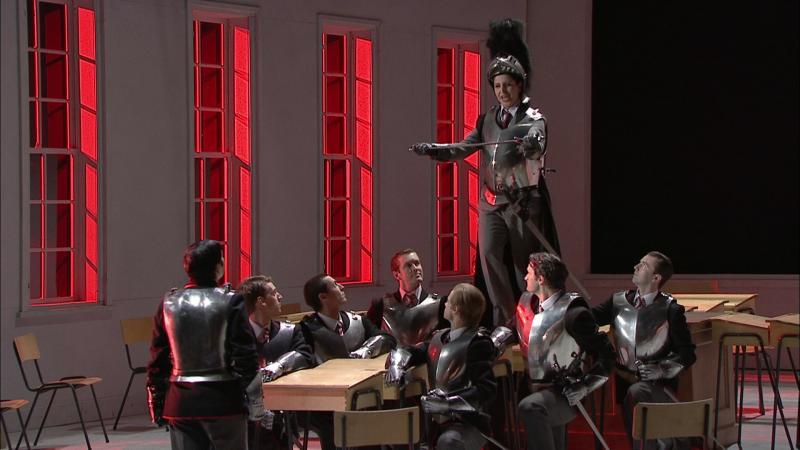

Handel Rinaldo opera to a libretto by Giacomo Rossi. Directed 2011 by Robert Carsen at Glyndebourne. Stars Sonia Prina (Rinaldo), Anett Fritsch (Almirena), Luca Pisaroni (Argante), Brenda Rae (Armida), Varduhi Abrahamyan (Goffredo), Tim Mead (Eustazio), William Towers (Christian Magus), Oliver Mercer (Herald), Rhian Lewis (Woman), plus Charlotte Beament and Rebecca van den Berg (Sirens). Ottavio Dantone conducts the Orchestra of the Age of Enlightenment (Leader Matthew Truscott). Harpsichord continuo Bernard Robertson; cello continuo Jonathan Manson; double bass continuo Chi-chi Nwanoku; theorbo continuo Elizabeth Kenny). Design by Gideon Davey; lighting by Robert Carson and Peter van Praet; movement direction by Philippe Giraudeau; dramaturgy by Ian Burton. Directed for TV by François Roussillon; sound supervision by Jean Chatauret. Good extras. Sung in Italian. No subtitles in Italian—sad for those learning opera Italian. Released in 2012, disc has 5.1 dts-HD Master Audio sound. Grade: A+
Rinaldo first hit the stage in 1711 when Handel was 26. It was performed maybe 50 times up to about 1730. After that it remained unperformed for 200 years! It was revived in 1931 and has been admired by early opera fans ever since.
Rinaldo is three times closer to Shakespeare than it is to us. The story is based on the Christian victory in the First Crusade (1100). The libretto is as relevant now as, say, the Black Plague and is politically incorrect. Then there is the problem with baroque opera of all the high voices. Of the 11 singers credited for this disc, one substantial part (Argante) is sung by a bass and a tenor sings a herald role for maybe 30 seconds. All the rest of the singers are women or countertenors, and there is a lot of cross-dressing. (Carson lampoons the cross-dressing in the initial scene, where all the school boys are girls, and in a battle skirmish where Rinaldo's troop of grown men dress as girls.)
So, why bother with Rinaldo? Well, modern composers have given up on writing music with beautiful melodies and traditional harmony. So if we want pretty music, why not mine the past? To do this well, we might have to make expensive changes in rewriting the libretto and transposing soprano music to new roles for tenors and baritones. (For an example, see the much under-appreciated Orphée et Eurydice where the castrato role was given to tenor Robert Alagna.)
Carson comes up with another way to update Rinaldo—the clever overlay. He doesn’t give us a story about warfare between cultures that no longer exist. Instead, he's interested in a horror that we all have some familiarity with: surviving the 8th grade. And the entire opera takes place while our 8th-graders are taking a history exam by writing an essay on the following question: "Was the First Crusade inspired by religious idealism or political revenge?" (This should placate hot-heads out there who might take umbrage at the Rinaldo story. We don't want any car-bomb attacks at the Glyndebourne interval (intermission).
Rinaldo (Sonia Prina) is about 14, and he has a crush on Almirena:
The other boys (girls actually) bully Rinaldo mercilessly:
And the bullies get Rinaldo blamed to boot. Rinaldo is caned by School Master Argante (Luca Pisaroni) and the new lady teacher, Miss Armida (Brenda Rae). There is more caning in this show, and some folks have complained. But it seems caning is an integral part of grade-school life in England, and all adults have several caning stories they use to intimidate their children.)
The exam is underway. As soon as Rinaldo starts to write, an army of knights under his command bursts through the blackboard to rout the bullies:
The general of the army, Goffredo (Varduhi Abrahamyan ), decorates Rinaldo. Almirena is Goffredo's daughter. Goffredo promises Almirena to Rinaldo when the army is victorious (in taking the school back from the forces of evil):
Now we learn more about School Master Argante, commander of the enemy:
We learn more about Armida. She controls the Furies from Hell, who attend the girl's school next door. These girls are apparently recognizable as St. Trinians students. St. Trinians obviously has a Gothic campus, which explains why the students there are Goth Girls:
Almirena (Anett Fritsch) and Rinaldo meet in the school yard for a love duet involving beautiful birdsong, which is provided by an OAE expert with the piccolo recorder. But as soon as our sweethearts exchange their chaste vows, Armida and the Goth Girls strike and abduct Almirena!
Rinaldo starts on an epic journey to rescue Almirena. If this image is confusing you, you're right: you saw this before in a movie about an extra-terrestrial being:
Now we have a quote from Homer, and we finally find out what sirens look like. Rinaldo is still learning the ways of the world. He gets seduced, hops on the boat, and is taken captive the same as Almirena:
Now for the ultimate teen-age horror-fantasy: teachers hitting on students! But our hero and heroine withstand all temptations. Almirena sings her famous aria "Lascia ch'io pianga" ("Let me weep.")
Sonia Prina does a great job acting like a 14-year old boy who is trying to act like a man. And Brenda Rae, who is really a wholesome girl from the American midwest, revels in playing a dominatrix in rubber:
Skirmishes lead to the release of Almirena and Rinaldo. Here's a shot from the Battle for the Chemistry Lab:
Rinaldo is back. To the tune of some of Handel's greatest trumpet music, he purifies himself for the final battle.
The final battle suddenly turns into a soccer match:
Rinaldo wins the match with a single goal scored in the last split-second:
Goffredo and Rinaldo pardon the losers and all reconcile:
Bolstered by his victories, but with malice toward none, Rinaldo contemplates the 9th grade:
This is a funny, light-hearted treatment of Rinaldo that is not silly and has no arbitrary injections of inexplicable Eurotrash. The sophisticated Glyndebourne audience loved this show. All the singing and acting is good. The OAE plays very well, and the sound recording is fine. The surprisingly small orchestra gives all the support the singers need. At the same time, you can always hear the signers well. For example, I often have trouble hearing countertenor Tim Mead on other recordings. But here I understand his singing and actually enjoy his preppy, enthusiastic personality. François Roussillon produces, as always, excellent PQ and video content with a nice variety of long-range to close-up shots.
It’s now 2021. I’ve watched this show many times over the last 10 years. It would be the perfect choice for introducing baroque opera to a newcomer. If you are a seasoned Handel fan, you will likely marvel at how well the story translates to the schoolyard and get a ton of laughs to boot. Each time I watch, I like it better. I gave this a lower grade originally. Now I upgrade to A+.
OR




















